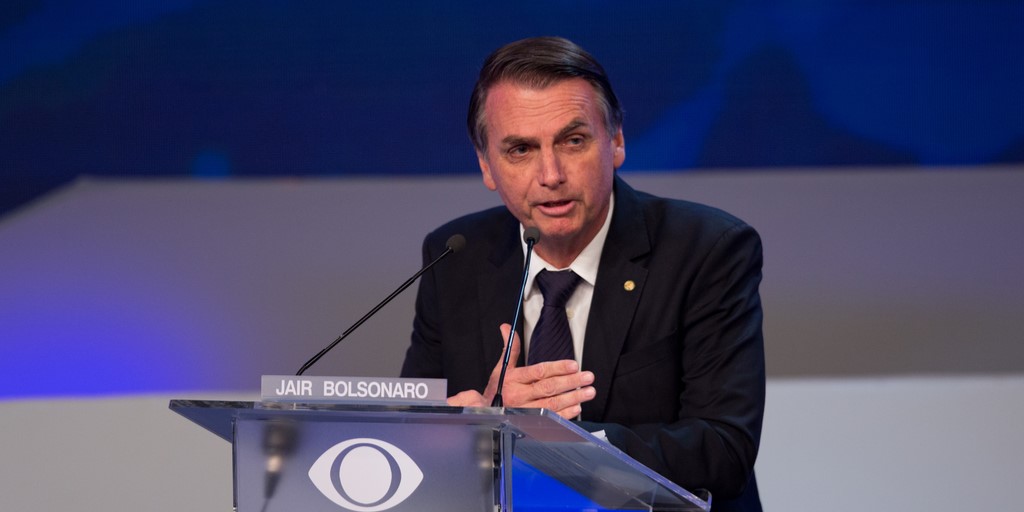The political turmoil in Brazil can be traced in large part to a powerful Supreme Court that has not earned the trust of the people.
Triumph of the “Tropical Trump”
Imagine the worst labels that can be placed on a person. “Fascist” has to be the very worst—and that is Jair Bolsonaro according to the mainstream Brazilian media, the nation’s professoriate, its artists and intellectuals. Despite this, Bolsonaro won the second round of Brazil’s presidential election last week by a wide margin, 55 percent to 45 percent for the candidate of the Workers’ Party, Fernando Haddad. Are there 57.7 million fascists in Brazil? Or did the “progressive” elite get it all wrong?
Yes, Bolsonaro was and is a supporter of the military regime that ruled the country from 1964 to 1985. But it was the Cold War, and the alternative was communism. That’s what the “anointed” people just don’t get, because they are sympathetic to socialism. Bolsonaro represents the anti-Left movement—the people tired of the legacy of the Worker’s Party, which ruled in Brazil for 14 years until President Dilma Rousseff was impeached two years ago.
The former army captain and seven-term deputy of the Social Liberal Party is not a classical liberal, though he has said lately that he has changed his mind about a lot of important economic issues. Importantly, he has chosen a free market advocate, Paulo Guedes of the University of Chicago, as his powerful Finance Minister. What he has always been is an ordinary guy who values decent mores, family, and tradition, and is not afraid to say so in a time when it’s the opposite of fashionable to do so.
The resounding victory of a hard-Right candidate is the Brazilian people’s response to economic depression, massive unemployment, large-scale corruption at the top, soaring crime, and unease over the crisis in Venezuela caused by the leftwing authoritarianism of Nicolás Maduro—a crisis that has impelled a rising number of Venezuelan migrants to enter Brazil. It’s also a backlash against the political elites, who betrayed democracy as they tried in vain to stave off the Workers’ Party’s fall from grace.
Speaking ideologically, the Left lost all contact with reality, with the common people, and got stuck in its cognitive bubble where everyone loves gender identity, political correctness, feminism, and racial movements. This Brazilian “victim’s revolution” (under the leadership, by the way, of rich white people) failed, and its failure opened the gates for the Right’s upsurge.
Donald Trump in America, Brexit in England, Mauricio Macri in Argentina, and now Bolsonaro in Brazil—they are part of the same phenomenon. The “forgotten men” found a way, with the help of social media, to push back against elitism. Yes, there is a populist component in all of this, and every classical liberal and even conservative should be alert to the risks. But as was the case in the 1960s, the alternative is worse: to keep going in this sinister direction, which could implode our Western civilization as we know it.
Freedom does not survive in a vacuum of moral values. The void is soon filled by something. In our modern times, it has been moral relativism, hedonism, identity policies, and tribalism. The Left has been promoting this agenda for a long time now, with horrible consequences. As the American Founding Fathers understood, inspired by the thinkers of the Scottish Enlightenment, only a virtuous people can sustain liberty. To think that we can ignore the moral structure that allows individual freedom and still have individual freedom is not only naïve, but dangerous.
Take the institution of the family, for instance. Whenever it weakens, the state steps in and the result is less individual freedom. Jonah Goldberg, in his book Suicide of the West (2018), explains it this way:
Healthy, well-functioning families are the primary wellspring of societal success. Unhealthy, dysfunctional families are the primary cause of societal decline. The family is the institution that converts us from natural-born barbarians into, hopefully, decent citizens. It is the family that literally civilizes us. Before we are born into a community, a faith, a class, of a nation, we are born into a family, and how that family shapes us largely determines who we are.
Brazil’s new President represents an attempt to rescue these lost values. Their meaning is stronger in the moral arena than anywhere else. Criminals, for example, cannot be treated as “victims of the system” anymore, as if they were not responsible for their own acts and choices. Collectivism, which sees the successful individual as an exploiter of others, has to be defeated if we want to live in a healthy society.
For the first time in a long time, Brazil will have an elected leader who cherishes Winston Churchill and Margaret Thatcher, not Che Guevara or Fidel Castro; who likes Trump, not Barack Obama; who supports the police, not the criminals. The platform Bolsonaro ran on points in the right direction: he talked about curbing Brazil’s bloated bureaucracy, lowering taxes, allowing Brazilians greater economic freedom, and treating crime, which has been soaring over the last couple of years, with “zero tolerance.”
Whether or not Bolsonaro will be able to take Brazil down this road of “Ordem e Progresso” (order and progress) is still an open question. There will be lots of obstacles in the way. The radical Left has already started issuing threats, and the establishment and its “deep state” will try to protect their privileges as well. But for once, Brazilians have someone who is outside of and against these structures vowing to take them on. The Right has a precious opportunity here and I hope Bolsonaro doesn’t waste it. It’s a single shot to prove that we can make a difference; that we can put Brazil back on track.

